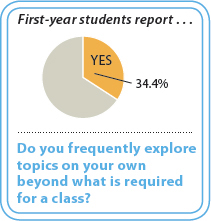Become Engaged in Learning
Is This You?
Are you a student athlete? If so, you might find that it’s tough to balance the demands of team practice and games with being a good student. To keep up with your studies you’ll need to go to every class and take advantage of all the academic help available to you through the athletic department and other campus resources. Whatever your athletic goal might be—whether it is to play on a professional team or just enjoy your sport as a college student—keep your eyes on the prize: a college degree.
To really learn and remember material from your classes, it is important to engage in learning. Engaged students devote the time and energy necessary to develop a real love of learning, both in and out of class. Engaged learners who have good listening and note-taking skills are primed to get the most out of college.
You can acquire knowledge by listening to a lecture, and you can better absorb the information by considering what that knowledge means to you. Practice the techniques of “active” learning: talking with others, asking questions in class, studying in groups, and doing more than the required reading. Investigate other information sources in the library or on the Internet. Think about how the material relates to your own life or experience. For instance, a psychology class might help you recognize patterns of behavior in your own family, or an anthropology class may increase your interest in learning more about your own cultural origins. When you are actively engaged in learning, you will not only learn the material in your notes and textbooks, but you will also practice valuable skills that you can apply to college, work, and your personal life such as the following:
- Working with others: Learning to work with others is one of the most important skills you can develop for success in college and your career.
- Improving your critical thinking, listening, writing, and speaking skills: These primary skills define a college-educated person.
- Functioning independently and teaching yourself: Your first year of college will help you become an independent learner who doesn’t always wait for an instructor to point you in the “right” direction.
- Managing your time: Time management sounds easy, but it is a challenge for almost all students, irrespective of their innate academic ability.
- Gaining sensitivity to cultural differences: The world we live in requires us all to develop our own knowledge about, and respect for, cultures that are different from our own.
Engagement in learning requires that you be a full and active participant in the learning process. Your instructors will set the stage and provide valuable information, but it’s up to you to do the rest. For instance, if you disagree with what your instructor says, politely offer your opinion. Most instructors will listen. They might still disagree with you, but they might also think more of you for showing that you can think independently.

Not all instructors teach in a way that fosters active learning. Ask your friends for recommendations on instructors who encourage active learning. Another way to become an active learner is to interact with professors, staff members, and other students both in person and electronically. You may find that some research professors at your institution offer first-year students the ultimate opportunity in active learning: one-to-one or small-group collaboration with professors in research projects and service activities.
Your college experience will be most rewarding if you take advantage of the resources your college offers, including the library, cultural events, faculty, and other students. You will also find many opportunities to become involved in campus organizations. Getting involved in out-of-class opportunities will help you develop relationships with others on campus. Use Facebook to connect with other students and with campus activities and groups. Join in discussions that are happening in those groups. All these approaches to learning have the potential to make you well rounded in all aspects of life.
PREVIEWING
- Previewing information before class is important. Previewing creates an organized mental outline for the lecture ahead of time. Take a moment to write down or type the title and headings of this chapter:
Getting the Most Out of Class
Become Engaged in Learning
Before Class
Participate in Class
Take Effective Notes
- Leave significant space between the headings for any notes, anecdotes, or ideas the professor might mention in the class lecture: The more information the instructor provides under a particular heading, the more likely that information will be emphasized on a test.
- You can use this previewing technique for all lecture classes that use a textbook as the main required reading, and it takes only 5 minutes to set up before class.